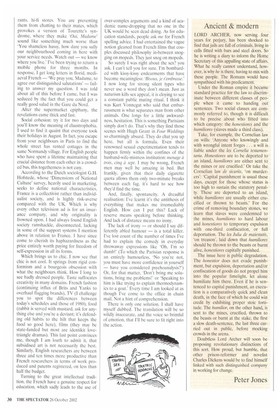Ancient & modern
LORD ARCHER, now serving four years for perjury, has been shocked to find that jails are full of criminals, living in cells fitted with bars and steel doors. So he is writing a diary to inform the Home Secretary of this appalling state of affairs. What he really cannot understand, however, is why he is there, having to mix with these people. The Romans would have sympathised with his predicament.
Under the Roman empire it became standard practice for the law to discriminate between different classes of people when it came to handing out sentences. Two social classes are commonly referred to, though it is difficult to be precise about who fitted into which category: the honestiores and the humiliores (slaves made a third class).
Take, for example, the Cornelian law on wills: 'Anyone who knowingly and with wrongful intent forges ... a will is liable under the fez Cornelia testamentaria. Honestiores are to be deported to an island, humiliores are either sent to the mines or are crucified.' Or take the Cornelian law de sicariis, 'on murderers': 'Capital punishment is usual these days, except for those whose status is too high to sustain the statutory penalty. These are deported to an island, while humiliores are usually either crucified or thrown to beasts.' For the crime of removing boundary stones, we learn that slaves were condemned to the mines, humiliores to hard labour and honestiores to temporary expulsion with one-third confiscation, or full deportation. The lex Julia de maiestatis, 'on treason', laid down that humiliores should be thrown to the beasts or burnt alive, honestiores capitally punished.
The issue here is public degradation. The honestior does not evade punishment, but expulsion, deportation and/or confiscation of goods do not propel him into the popular limelight, let alone humiliate him there. Even if he is sentenced to capital punishment, an execution is a comparatively quick and clean death, in the face of which he could win credit by exhibiting proper stoic fortitude. The humilior, on the other hand, is sent to the mines, crucified, thrown to the beasts or burnt at the stake, the first a slow death-sentence, the last three carried out in public, before mocking crowds in the arena.
Doubtless Lord Archer will soon be proposing revolutionary distinctions of this sort. How proud, but humble, that other prison-reformer and novelist Charles Dickens would be to find himself linked with such distinguished company in working for change.
Peter Jones


















































































 Previous page
Previous page